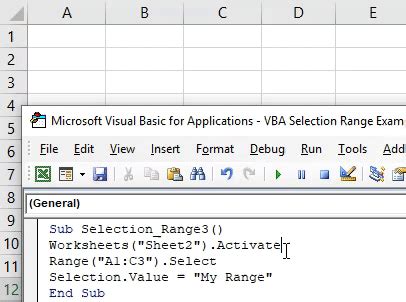
In the world of Excel Visual Basic for Applications (VBA), selecting a worksheet is a fundamental task that you'll encounter frequently. Whether you're automating tasks, creating reports, or developing complex applications, being able to target and manipulate specific worksheets efficiently is crucial. Here are five ways to select a worksheet in VBA, each serving a slightly different purpose and use case.
Understanding the Basics of Worksheet Selection
Before diving into the methods, it's essential to understand the basics of how VBA interacts with Excel worksheets. Worksheets in Excel are part of the Worksheets collection within a Workbook object. You can access a specific worksheet by its index (position in the workbook), its name, or through a loop that iterates through all worksheets in a workbook.

1. Selecting a Worksheet by Its Name
One of the most straightforward methods to select a worksheet is by referencing its name directly. This approach is useful when you know the exact name of the worksheet you want to select.
Sub SelectWorksheetByName()
Dim ws As Worksheet
Set ws = ThisWorkbook.Worksheets("Sheet1")
ws.Select
End Sub
2. Selecting a Worksheet by Its Index
Every worksheet in a workbook has an index, starting from 1. This method is handy when you know the position of the worksheet you're interested in.
Sub SelectWorksheetByIndex()
Dim ws As Worksheet
Set ws = ThisWorkbook.Worksheets(1)
ws.Select
End Sub
3. Looping Through Worksheets
Sometimes, you might need to perform an action on multiple or all worksheets in a workbook. In such cases, looping through the Worksheets collection is a practical approach.
Sub LoopThroughWorksheets()
Dim ws As Worksheet
For Each ws In ThisWorkbook.Worksheets
' Your code here
ws.Select
' Continue with your task
Next ws
End Sub
4. Selecting a Worksheet Dynamically
There are scenarios where you might not know the name or index of the worksheet beforehand. For example, if the user is prompted to select a worksheet, you can use the Application.InputBox method to get the worksheet object.
Sub SelectWorksheetDynamically()
Dim ws As Worksheet
Set ws = Application.InputBox("Select a worksheet", "Worksheet Selector", Type:=8).Parent
ws.Select
End Sub
5. Selecting a Worksheet Based on Conditions
You might need to select a worksheet based on certain conditions, such as its name containing a specific string or having a particular tab color. This requires a bit more creativity but can be achieved by looping through worksheets and applying your conditions.
Sub SelectWorksheetByCondition()
Dim ws As Worksheet
For Each ws In ThisWorkbook.Worksheets
If ws.Tab.Color = 255 Then ' Select worksheets with red tab color
ws.Select
Exit For
End If
Next ws
End Sub




How do I select a worksheet in VBA?
+You can select a worksheet in VBA by its name, index, or through a loop that iterates through all worksheets in a workbook. Use methods like `ThisWorkbook.Worksheets("Sheet1").Select` for direct selection or loop through `ThisWorkbook.Worksheets` for more dynamic approaches.
Can I select a worksheet based on its tab color?
+Yes, you can select a worksheet based on its tab color by looping through the worksheets and checking the `Tab.Color` property. For example, `If ws.Tab.Color = 255 Then` can be used to select worksheets with a red tab color.
How do I dynamically select a worksheet in VBA?
+You can dynamically select a worksheet by using the `Application.InputBox` method. Set the type to 8 and use `.Parent` to get the worksheet object. For example, `Set ws = Application.InputBox("Select a worksheet", "Worksheet Selector", Type:=8).Parent`.